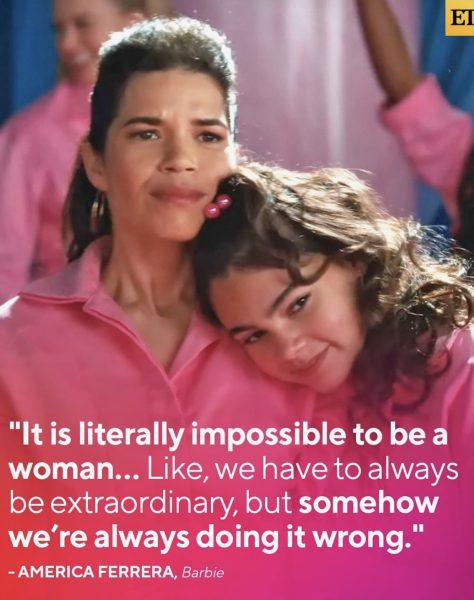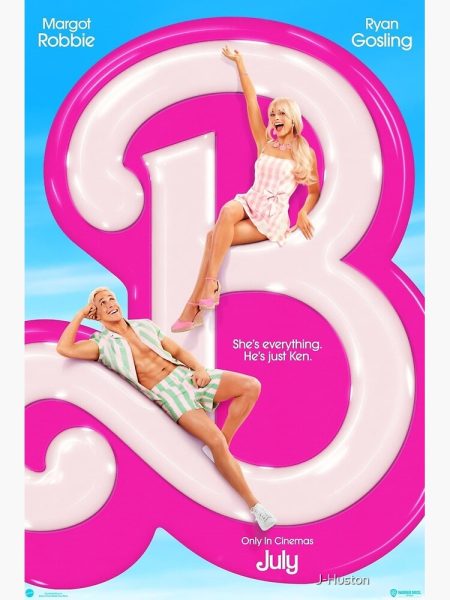When the Barbie movie hit theaters on July 21 last year, everyone rushed into the theaters expecting a spinoff of the cartoon Barbie, but leaving with much more.
The film follows “Stereotypical Barbie’s” discovery of who she is and who she wants to be as she journeys to the real world. We see her fail, succeed, and everything in between. The film focuses heavily on the role of a woman in today’s society and how difficult it can be to meet the expectations laid out for us.
Barbie also centers around the idea of patriarchy, and its place in modern day society. As the film progresses, we see the character Ken enter the real world and discover the idea of male dominance, and we see him bring his newfound knowledge to Barbieland.
As the Barbie movie grew in popularity, the message that it presented was increasingly discussed and debated.
While some agreed with the lesson and others did not, there was a clear message beyond all the fun dancing and colorful costumes.
America Ferrera said it perfectly as her character, Gloria, describes the harsh reality of being a woman, “You have to never get old, never be rude, never show off, never be selfish, never fall down, never fail, never show fear, never get out of line… And it turns out in fact that not only are you doing everything wrong, but also everything is your fault.”

Although Barbie’s fantasy world may have been the more attractive option, she chooses the real world where she can prove to everyone that she is more than just a doll. The Barbie movie dives into the sad truth behind expectations for women and their lackluster empowerment.
Flash forward six months, and the film acquired numerous awards, along with awards for the directors and cast alike. Unsurprisingly, the film that was centered around women empowerment earned awards for the women that put in a tremendous effort.
And then, the nominations for the Oscars were released, and only one woman was nominated for an award, leaving out many of the women who helped construct the movie. First and foremost, the director and the brains behind the film, Greta Gerwig, was left out of the Best Director category, despite holding the Number 1 movie of the year in the box office.
Likewise, Margot Robbie, who starred as Barbie in the movie, was not nominated for Best Actress despite securing numerous awards this year for her acting work in Barbie, including nominations at the Golden Globe and Critics Choice Awards.
So when Ryan Gosling was nominated for Best Supporting Actor, did the media overreact? Or did his nomination prove the whole point of the Barbie movie? When the whole film was centered around female empowerment, how were none of the starring women nominated, but the lone man was? Isn’t that what the Barbie movie was about- how women are constantly viewed as less than, secondary, a mere afterthought?
It raises the question: Did we miss the message of the Barbie? Did all of the hard work that the producers put into the movie go right over our heads?
Not only did the Oscars miss the message, but many people chose to look at the theme of this inspiring film and instead of appreciating it, they made fun of it.
However, reading the criticisms from this movie only adds to the irony of what’s being criticized. The movie was produced as an empowering and inspiring moment for young girls, but still many just saw it as a movie to show how a ‘pretty girl’ reacts to discovering the demand of societal beauty standards. Being women, it’s so important that we continue to break those stereotypes and continue to support one another. We can’t continue to let critics and these ‘set standards’ define the way we live our lives.

Jo Koy supports this argument with his jokes during the Golden Globes. While standing in front of an audience of his peers, he confidently made a joke about the rivalry between Oppenheimer (another film up for several awards at the Golden Globes) and Barbie.
“Oppenheimer is based on a 721-page Pulitzer Prize-winning book about the Manhattan Project, and Barbie is on a plastic doll with big boobies,” he said. “The key moment in Barbie is when she goes from perfect beauty to bad breath, cellulite, and flat feet, or what casting directors call character actors!”
This “skit,” which was meant to be comedic, instead struck a nerve for many viewers, particularly those who were involved in the movie, since it so obviously contradicted the underlying message about sexism.
However, the main message of this movie should not be overlooked behind these harsh critics.
The Barbie movie was revolutionary as a whole, and brought up a topic that most audiences wouldn’t normally feel comfortable addressing, but because of the film’s popularity, the topic of modern day feminism has gradually become more normalized.
But with popularity comes criticism, which only adds to the irony of the constant controversy of the Barbie movie. We can only hope that as time goes on, everyone will not only learn to appreciate the message from this film, but learn from it.









